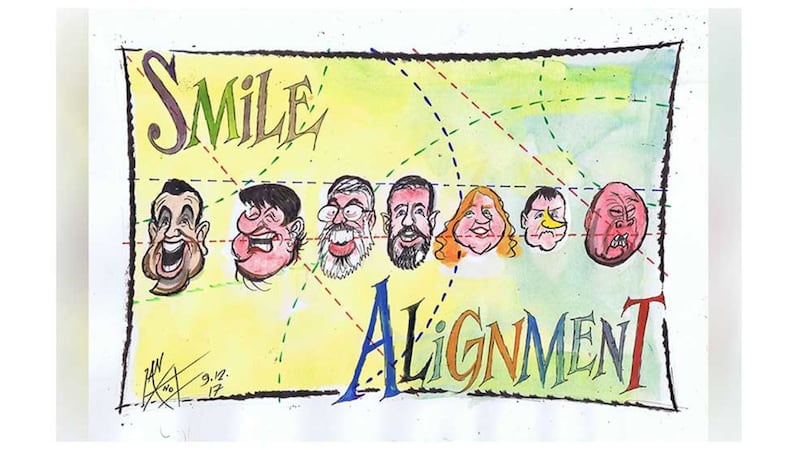THE British government and the EU yesterday paved the way for the second phase of Brexit negotiations after settling on a series of principles for tackling the sticking points of citizens' rights, the Irish border and the so-called divorce bill.
British prime minister Theresa May joined European Commission president Jean-Claude Juncker at a pre-dawn press conference in Brussels to announce that a last-minute deal had been brokered.
Both sides had hoped to finalise agreement last Monday but their plans were torpedoed by the DUP over fears the proposed arrangements would create trade barriers between Northern Ireland and Britain.
Those concerns have been allayed in the document released yesterday, which gives assurances that "no new regulatory barriers" will be allowed between the north and Britain and the region's businesses will have "unfettered access" to markets across the Irish Sea.
The deal is expected to be approved by the remaining 27 EU states at a summit on December 14-15.
It will clear the way for negotiations on the future relationship after the UK's withdrawal from the EU.
The breakthrough was hailed by Mrs May as a "hard-won agreement in all our interests".
It guarantees "no hard border" between Northern Ireland and the Republic and that the "constitutional and economic integrity of the United Kingdom" will be maintained.
EU citizens living in the UK and vice versa will have their rights to live, work and study protected, while Britain will pay Brussels a settlement bill of between £35bn and £39bn.
The agreement states that if no future trade deal is reached, the UK as a whole will maintain "full alignment" with those elements of the EU single market and customs union that support north-south cooperation, the all-island economy, and the protection of the Good Friday Agreement.
DUP leader Arlene Foster said she had "cautioned the prime minister about proceeding with this agreement in its present form" but that Mrs May chose to proceed.
The former first minister said "nothing is agreed until everything is agreed" and that the the 10 DUP MPs currently propping up a minority Tory government would only back the final trade deal if happy with its contents.
"Along with like-mind colleagues across the House of Commons, we will ensure that there is no backsliding on the promises made about the integrity of the union," she said.
Taoiseach Leo Varadkar, who held telephone talks with Mrs May on Thursday as the details of the deal were hammered out, said it was a "significant day" for Ireland, which "achieved all that we set out to achieve in phase one of these negotiations".
He said the joint commitment by the EU and Britain to the retention of a free-flowing border between Ireland and Britain was "rock solid and cast iron" and described assurances outlined in the agreed text as "politically bulletproof".
"We have protected what we sought to protect and we achieved what we sought to achieve," he said.
Sinn Féin president Gerry Adams gave the deal a "cautious and qualified" welcome.
"While the communiqué recognises the unique and special circumstances surrounding the issue of the Irish peace process, the Good Friday Agreement and the border it does not address key areas of concern for many citizens, especially nationalists living in the north and citizens in the border region," he said.
"The insistence by the British that Britain and the north must leave the customs union and the single market presents a real and live danger which cannot be understated."
SDLP leader Colum Eastwood welcomed the guarantee of no hard border.
"Those of us interested in preventing a hard border in Ireland and protecting our businesses and our people will focus on the substance," he said.
"The specific emphasis on the role and relevance of the Good Friday Agreement is particularly welcome in this text."
Ulster Unionist MEP Jim Nicholson said the British government must be held to its commitment that there can be no "internal borders or barriers to trade" within the UK.
"While what happened on Monday was clearly a shambles, it has demonstrated to the UK government and EU27 leaders that pro-union people right across the nation will not accept Brexit being used as an excuse to unravel the United Kingdom," he said.
Alliance deputy leader Stephen Farry said the deal was a strong foundation on which to build.
"Any type of Brexit will bring some degree of friction and lost opportunity, but we have to find a solution that works for Northern Ireland society and our economy, and maximises our connectivity and opportunities," he said.
Jeremy Corbyn said Mrs May had only managed to "scrape through" the first phase of Brexit negotiations some 18 months after the referendum.
"Tory chaos and posturing has caused damaging delay and risked serious harm to our economy," said the Labour leader.
Ukip's former leader Nigel Farage said: "This is not a deal, it's a capitulation."








